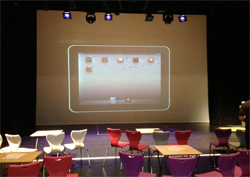
Matt Britland is Director of ICT at The Lady Eleanor Holles School and is also also the Director of Realise Learning, education consultancy. He writes for the guardian Teacher network and specialises in mobile technology, social media, education technology, Computing and is a regular conference speaker.
Given how often most students access social media sites, it’s now becoming more common for schools to utilise them for education purposes. The Lady Eleanor Holles’ director of ICT Matt Britland waxes lyrical on how social media can help innovate your school.

The summer is not too far away, and many school will be thinking about next year. Perhaps 2014-15 is the time for your school to begin to use social media, if you’re not using it already. Maybe you're already using social media but would like to experiment with different services? Using social media in education can show young people how it can be used responsibly and productively. I have compiled a list of social networks to try and how they can be used.
After Bett last month, many in the education industry are considering the current state of technology in the classroom. There’s a wide range of gadgets that teachers can consider, and Matt Britland gives his thoughts on the options available.

Last year I wrote an article for the Guardian on the future of technology in education. This article focused on ‘The Cloud’ and its impact on education, whilst only briefly mentioning devices. As it’s now 2014, I thought it would be useful to revisit this subject and take a look at some things to look out for and how they can be used to support teaching and learning over the coming years.
Schools are taking tablets very seriously at the moment, and many are investing in new devices. Apple has a bit of a stranglehold in education with its iPad, but with an influx of cheaper tablets more and more schools may opt for Android devices like the Tesco Hudl. Microsoft are trying to get involved with its new Surface 2, so 2014 or 2015 may see Apple losing its grip. The iPad is my preferred device, but it is expensive and schools need to decide how tablets will be used to support teaching and learning before they splash out. From a personal point of view, Apple need to make some improvements in order to keep ahead. Not all schools want to go 1:1, and there needs to be far better ways to manage devices used across the school. Multiple profiles on devices would be fantastic, as would true multitasking with apps working side-by-side; some operating systems are already offering this. Apple and other providers need to start talking to schools if they want us to invest money in their devices. Tablets are not always suitable for certain needs, Google Chromebooks are making headway in schools as many are looking at adopting Google Apps, which is free for education use.

There are many potential benefits of using social media in the classroom: it can improve your relationship with pupils, and inspire them to spend more time on their work. Before setting up a Facebook or Twitter account, however, significant preparation is required. Here are my top 5 tips:
This is essential if you are going to convince your school that using social media in education is a good idea. Why do you want to use social media? Is it primarily for teaching and learning, or communicating with students, parents or even the public?
In order to get an idea whether your use of social media has worked you will need to decide what your aims and objectives are, and assess how well these have been met later on. If you’re stuck, do some research on how other schools have used social networks. You could also check educational blogs and ask some questions on Twitter.
Matt Britland focuses on the impending force of cloud computing as the future dominant mover and shaker in schools and colleges which is set to underpin what we now call 'social learning'.

A couple of weeks ago I was asked what I thought the future of technology in education was.
It is a really interesting question and one that I am required to think about all the time. By its very nature, technology changes at a fast pace and making it accessible to pupils, teachers and other stakeholders is an ongoing challenge.
So what is the future? Is it the iPad?
No, I don't think it is. For me, the future is not about one specific device. Don't get me wrong, I love the iPad. In fact, I have just finished a trial to see if using them really does support teaching and learning – and they have proved effective. I've written about the trial in more detail on my blog.
Photo credit: johnnyryan1
Nine months after his school introduced iPads to the eager hands of pupils and a few not-so-eager teachers, Matt Britland offers us a rare insight into how effective their implementation has been in an evaluative study which incorporates the opinions of both teachers and students. We really like how the easily-digestable data is displayed visually, and the depth of the information provided in the project outlines, which is tailored to each subject. The actual report is in a PDF document which you can download here.

Back in September we began an iPad trial. I have finally written my report.
The report includes the following sections:
Click the 'Read More' button below to download the report from Matt's blog.
Photo credit: Tsubaki Kaworu

For the past year I have been trialing the use of Facebook groups in school, to see if they improved communication with some of our students.
I have finally written a brief report on my findings. These include surveys given to teachers and students, as well as some recommendations for next year.
Click the 'Read More' button below to download the report from Matt's blog.

On Friday 28th of September we finally launched our iPad trial to all staff. There were only about three weeks to organise the event, but the whole thing went very well. Staff left excited, inspired and full of ideas. It really was an outstanding day!
After the summer holidays, I came back to school with the exciting prospect of our iPad trial. However, I realised how much work there was to do. Planning the launch to HoDs, as well as organising a whole school INSET, was pretty stressful. Luckily, the Assistant Head (teaching and learning) was amazing and really helped organise everything.

The use of social media in education continues to be something of a hot topic with arguments both for and against.
So I carried out a small survey of 27 teaching professionals in order to create a baseline of understanding into the use (or not) of social networking in schools, and also any concerns over some of the e-safety risks. The full survey results can be found here.
There are many uses of social media in education – below are just a few of the ways they can be effectively used.

As the use of social media in education increases, so does the argument for and against. The purpose of this article is to try and take a balanced view of both sides of the coin and also to look at some of the reasons why schools won’t engage using social media. In order to achieve this, Matt Britland and Alan Mackenzie have collaborated, with Matt looking at the curriculum aspects, and Alan looking at any e-safety aspects.
The first step to understanding some of the issues was to create and Tweet out a link to a survey of 10 simple questions, the results of which were all saved to a Google Docs spreadsheet. Then, a further Google Doc was created to collaboratively write the article.

In my experience, students have never been brilliant at checking their school emails, especially the older kids. This makes communicating with them quite difficult when they are not sat in your class.
A great way to improve this is to use Facebook groups. Now, this presents a problem. The main one being schools tend to be terrified of social networks. Possibly because they do not understand them? However, if you have a forward thinking school, you can overcome this by showing them how useful they can be. Once they are aware of this they may let you give Facebook groups/Twitter a go.

A community-driven platform for showcasing the latest innovations and voices in schools
Pioneer House
North Road
Ellesmere Port
CH65 1AD
United Kingdom